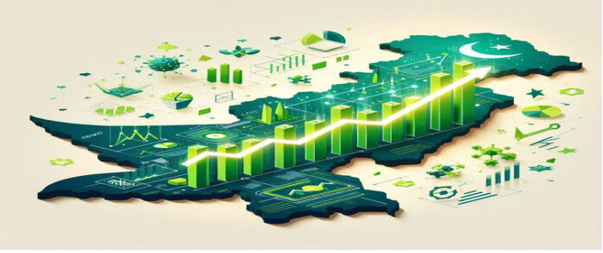i INP-WEALTHPK
Ayesha Saba
Pakistan’s economy must diversify beyond traditional agriculture and low-value manufacturing to achieve sustainable and inclusive growth, the State Bank of Pakistan (SBP) said in its Annual Report 2024-25. The report calls for a policy shift toward high-value services, technology, and tourism to reduce vulnerability to climatic shocks, global commodity swings, and fiscal pressures that have historically constrained economic performance.

The central bank noted that while agriculture still provides livelihoods for nearly two-fifths of the population, its share in GDP has been shrinking due to climate variability, water shortages, and low productivity. It highlighted that the slowdown in agricultural growth during FY25 underscores the urgency of broad-based structural reforms that could create new engines of expansion. In contrast, the services sector has emerged as the mainstay of recent growth, driven by digital transformation, logistics, and public services. However, the SBP cautioned that services growth remains concentrated in a few urban regions, leaving many areas economically under-served.
The report argued that diversification must extend both across and within sectors. In manufacturing, Pakistan needs to move from low-margin textile exports toward engineering, food processing, pharmaceuticals, and renewable-energy equipment. In services, the country should capitalize on its demographic dividend by expanding information technology, freelancing, education, and tourism. Together, these emerging areas could generate high-skill employment, attract foreign investment, and strengthen external resilience.
Highlighting the potential of tourism, the SBP devoted a detailed section titled “Unlocking Pakistan’s Tourism Potential.” It cited global data showing that travel and tourism account for about 10 percent of world GDP and support 357 million jobs—one in every ten jobs worldwide. Despite Pakistan’s rich natural and cultural heritage, its total (direct and indirect) contribution to GDP was only 5.9 percent in 2022, providing 4.2 million jobs. The country ranked 101 out of 119 on the World Economic Forum’s Travel and Tourism Development Index 2024, far below its potential.
The report described Pakistan’s tourism assets as uniquely diverse, ranging from the snow-capped peaks of Gilgit-Baltistan and the beaches of Balochistan to the archaeological treasures of the Gandhara and Indus Valley civilizations. Yet inadequate infrastructure, inconsistent service standards, limited marketing, regulatory hurdles, and outdated perceptions of security have left most destinations underdeveloped. The SBP said that addressing these bottlenecks through strategic investment and public-private collaboration could substantially raise the sector’s contribution to growth and job creation.
Globally, tourism has one of the highest economic multipliers. According to the report’s referenced World Bank Panama Case Study (2024), every dollar of tourism value-added generates about US$2.9 in total economic income, while each direct tourism job supports four additional jobs in agriculture, construction, retail, manufacturing, and financial services. The SBP explained that such linkages make tourism a catalyst for broad-based development, spreading benefits across rural and urban communities. Infrastructure investments for airports, roads, and railways driven by tourism can also stimulate construction, energy, and services, amplifying economic activity.
The central bank underlined tourism’s social and environmental significance. Women comprise roughly 54 percent of the global tourism workforce, making it one of the most gender-inclusive sectors. In Pakistan, expanding eco-tourism and community-based tourism could empower women and youth in remote areas. Environmentally, responsible tourism can help fund conservation, as seen in successful eco-models abroad. However, the SBP cautioned that tourism accounts for about 8 percent of global carbon emissions, urging the adoption of sustainable practices and stronger regulatory oversight to minimize environmental impact.
The report acknowledged recent government initiatives aimed at harnessing this potential. It cited the Special Investment Facilitation Council (SIFC) for simplifying procedures, promoting “Green Tourism Pakistan,” and facilitating investment through public-private partnerships. It also welcomed steps to expand e-visa and visa-on-arrival facilities, which have improved accessibility for foreign visitors. Nevertheless, the SBP stressed that these policy measures must be supported by continuous investment in transport connectivity, modern airports, digital infrastructure, and hospitality training to elevate Pakistan’s competitiveness in the global tourism market.
Beyond tourism, the SBP linked diversification to broader productivity reforms. It said Pakistan’s workforce remains under-skilled relative to regional peers and that innovation, technology adoption, and vocational training are crucial for upgrading both services and industry. Investments in ICT infrastructure and data services, coupled with incentives for startups, could integrate Pakistan more deeply into global value chains. The report highlighted that expanding financial inclusion, particularly for women-led and youth enterprises, would further support diversification and entrepreneurship.
Fiscal policy, the SBP said, must also encourage new sectors through predictable taxation and stable incentives rather than ad-hoc relief packages. It recommended aligning provincial development programs with tourism, information technology, and services priorities to avoid duplication and ensure efficient resource allocation. Improved coordination among ministries, provincial departments, and the private sector would be critical to translating potential into sustained outcomes.
Concluding its analysis, the central bank observed that diversification is not only an economic necessity but also a resilience strategy. By reducing dependence on weather-sensitive crops and energy-intensive industries, Pakistan can stabilize growth, expand exports, and create millions of jobs in knowledge-based and environmentally responsible sectors. The report summed up that “building a diversified, high-value economy driven by tourism, technology, and services will be central to achieving long-term stability and inclusive prosperity.”
Credit: INP-WealthPk



